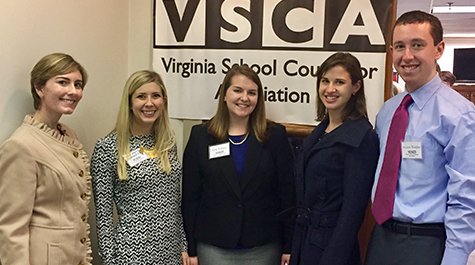School counseling students advocate at the Virginia General Assembly
Although the American School Counselor Association now recommends a ratio of one school counselor for every 250 students in K-12 schools, the average in Virginia’s public schools is about 1:425. That means that school counselors have approximately 35 minutes per student per year to spend on individual student planning.
A group of W&M counseling students traveled to Richmond earlier this month to discuss this issue, among others, with state legislators on the opening day of the Virginia General Assembly’s 2017 session.
Four master’s students and one alumna of the school counseling program participated as part of the Virginia School Counselor Association’s Legislative Day, which brings representatives of the profession to the capitol to engage with legislators.
“I thought this would be a great first opportunity to advocate for my profession,” said Erin Palmer, a master’s student and aspiring elementary school counselor. “If I don’t take the opportunity to get out there and at least try, then who will? This mindset proved true as I was the only constituent from my districts.”
Palmer, who is from Yorktown, VA, was able to meet with both her representative, Del. Gordon Helsel (91st district), and an aide for Sen. Mamie Locke (2nd district). “We believe that lowering the student to school counselor ratio will allow us to devote more time to each of our students and catch any who might otherwise slip through the cracks,” said Palmer. “I was glad to hear that both representatives said they would support the initiative.”
Austen Winkler, a second-year student in the program, enjoyed the opportunity to educate legislators about the work that counselors do. He discussed the profession’s move away from the title “guidance counselor” with its emphasis on college and career guidance. “School counselors do so much more—we focus on the social and emotional well-being of students, as well as their academic success and career goals.”
Advocacy is an important component of the school counseling program at William & Mary, and students are encouraged to take an active role in identifying and dismantling barriers to their students' personal, academic or career development. "Throughout their coursework, school counseling trainees learn about models of leadership and advocacy so that they can be change agents in their future schools," said Patrick Mullen, assistant professor of counselor education.
"This past fall I surveyed a class of second-year school counseling students to see if they would be interested in taking a trip to Washington D.C. to meet with elected officials and every student in the class said 'yes,'" added Mullen. "Their enthusiasm is inspiring to me because it shows how passionate they are in supporting student success and school reform."
For Palmer, these opportunities are empowering. “I now have a more realistic idea of what to expect when talking with government officials, who sometimes only know as much on a topic as you tell them,” she said. “This trip taught me to own the mindset of ‘I know what I’m talking about’ that will help me as I continue to advocate for my profession.”
